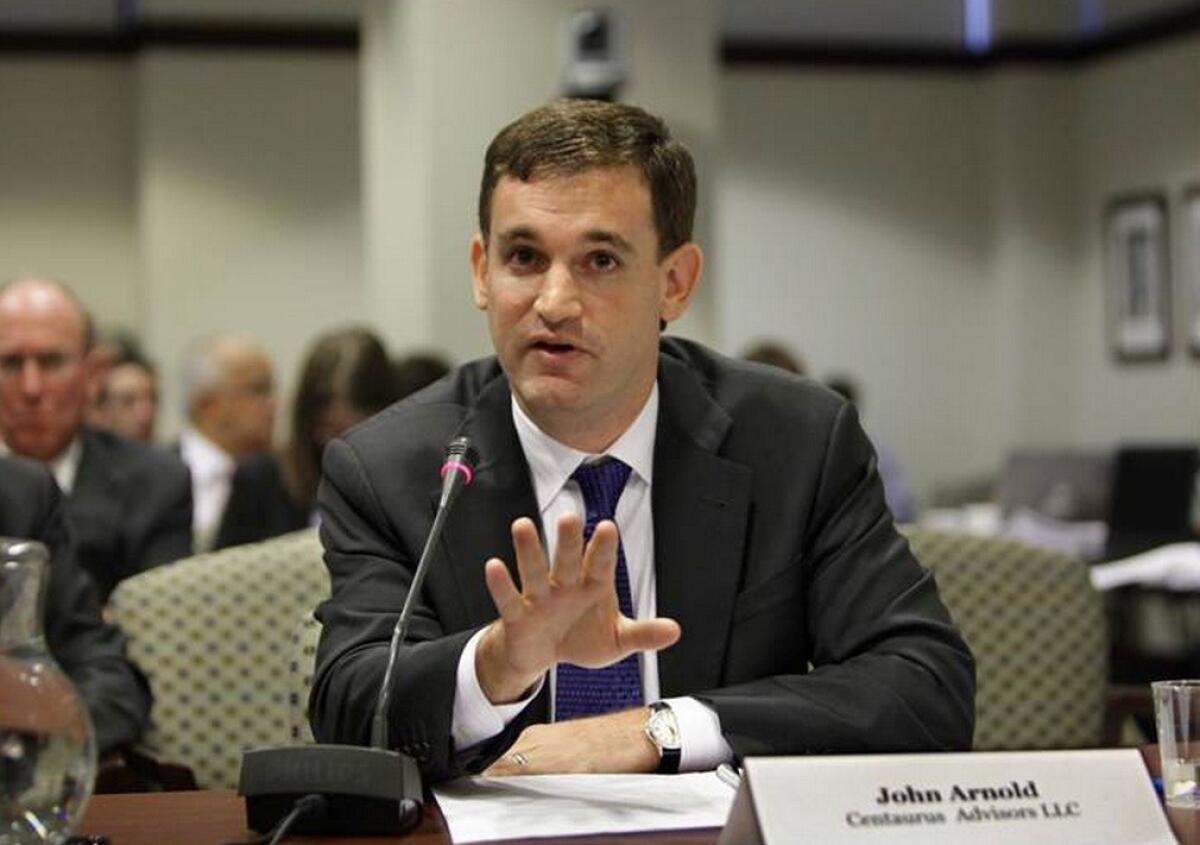How PBS sold its soul to a billionaire donor

What does he get out of this? Billionaire former Enron trader John D. Arnold, a backer of the campaign against public employee pensions, testifies in Washington in 2009.
- Share via
A few days ago the Public Broadcasting Service announced it was returning a $3.5-million grant it had received from a Texas billionaire to fund a series of documentaries about the “pension peril” -- the costs to cities and states of their public employee retirement obligations. PBS took the action after a report in the tech news website PandoDaily exposed the conflict of interest underlying the original donation.
That was the good news. The bad news was that PBS had accepted the funding from a self-interested billionaire in the first place. The worse news is that this sort of fundraising from the rich has undermined what originally set PBS apart -- its independence from vested interests.
The $3.5-million grant had been made by John D. Arnold, a billionaire natural gas trader from Houston. The series of news segments on the PBS NewsHour it funded, “Pension Peril,” included an episode on California public pensions. That segment mentioned a ballot initiative being pushed in the state to roll back public employee pensions -- an initiative campaign being partially funded by, yes, John D. Arnold (through something called the Action Now Initiative).
Most Californians don’t recognize John Arnold’s name. They should. Before setting up his own trading firm, he was an energy trader at Enron -- a firm that ruthlessly manipulated the California energy market, leaving the state’s residents with costs they’re still paying.
Arnold’s role in that chicanery isn’t clear, but in 2006 Sen. Dianne Feinstein lit into him for pleading the 5th Amendment when asked in a deposition “whether he had ever manipulated the Western energy markets while at Enron.”
As for the “Pension Peril” series, it’s typical of reporting that treats public employee benefits as though they’re the chief cause of municipal fiscal problems. They’re not; their importance is consistently exaggerated by special interests who have ulterior motives for attacking public employees.
The “Pension Peril” installment on California paints municipal employee benefits as a driver of the bankruptcy of the city of Vallejo; you have to listen very carefully for the fleeting references to the role of the loss of a shipyard -- a major employer in town -- and the overall economic downturn.
Nor will you hear any reference to the real cause of underfunding of public employee pensions in California, which was the foolhardy decision in the 1990s to give municipalities a “holiday” on their annual pension contributions because the stock market was soaring so high. When the markets crashed in 2008, the rot created by that decision was exposed by the receding tide. (More recently, the rising markets have begun to restore health to the pension funds.)
PBS, WNET -- the New York public TV station that produced the pension series and got the grant -- and Arnold all say that Arnold exercised no influence over the content of the series. Of course he wouldn’t have to, directly. What’s insidious about this sort of corporate funding is that the real influence is implicit.
That’s alluded to by the PBS ombudsman, Michael Getler, in his report on the Arnold affair. He wrote: “It shines a light, once again, on what seems to me to be ethical compromises in funding arrangements and lack of real transparency for viewers caused, in part, by the complicated funding demands needed to support public broadcasting.”
In another such case, a PBS unit that funded independent documentaries canceled a film about the Koch Brothers last year, fearing the reaction of one of its major donors, David Koch.
That underscores the cynicism of the steady withdrawal of public funding from PBS since the Reagan administration. It’s another example of the old story of big government getting off the horse, so big business and the wealthy can saddle up. As David Sirota, the author of the PandoDaily expose, wrote in its aftermath, PBS doesn’t stand for “Public Broadcasting Service” anymore. As it becomes more addicted to big-bucks donors, it risks becoming the Plutocrat Broadcasting Service.
More to Read
The biggest entertainment stories
Get our big stories about Hollywood, film, television, music, arts, culture and more right in your inbox as soon as they publish.
You may occasionally receive promotional content from the Los Angeles Times.











